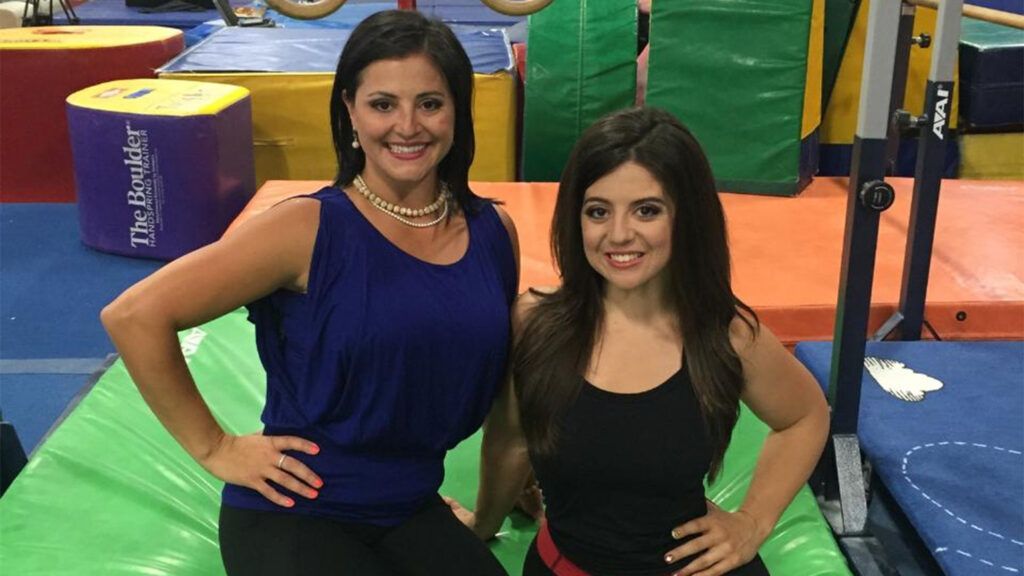Eight-year-old Jen Bricker was glued to the television. It was 1996 and the second-grader and her parents were in their living room, not wanting to miss a single minute of the Summer Olympics, broadcasting live from Atlanta.
Her eyes widened as 14-year-old gymnast Dominique Moceanu soared, flipped and twisted through the air, becoming the youngest American athlete ever to win a gold medal. It was Dominique’s appearance, however—her caramel-tinted skin and big, dark eyes; her small, powerful frame—that was transfixing. No one in tiny Hardinville, Illinois, had that look. No one except Jen. She felt as if she were watching herself.
“I was infatuated with her, practically obsessed,” Jen recalls today. “Not only did she look like me, but she had the same fiery personality and we both loved gymnastics.”
BROWSE OUR COLLECTION OF BOOKS ABOUT MIRACLES AND ANGELS
Dominique’s parents had been born in Romania, the same country Jen’s birth parents had emigrated from before she was put up for adoption at three months old. That summer evening, Jen set her sights on following in Dominique’s footsteps. The gold medalist would become her role model. Jen would do whatever it took to excel in gymnastics. A dream she was so intent on achieving that she ignored the most obvious difference between her and her idol.
Jen had been born without legs.
From the moment Sharon and Gerald Bricker brought Jen home, they were determined their infant daughter could accomplish anything she set her mind to. “They didn’t see me as different,” Jen says. “They raised me to be strong and confident. That’s how I always saw myself.” Sharon and Gerald had desperately wanted a baby girl to add to their family of three boys. But a hysterectomy ended Sharon’s dream of having another baby. She asked God for a miracle.
Not long after, a friend who was looking to adopt told her about a baby being cared for by a foster family an hour away. The infant was as cute as a button, but her legs had never formed in the womb. The friend didn’t feel able to raise a child with such challenges—no doubt the same reason the baby had been put up for adoption in the first place. But the story touched Sharon. When the Brickers met the baby, all they saw was her smile. “My mom knew right then that I had to be their daughter,” Jen says.
At Jen’s first well-baby checkup the doctor suggested she would never be able to sit up or crawl. She would need to be carried everywhere. Sharon and Gerald sought a second opinion. They took Jen to a specialist at Shriners Hospitals for Children in St. Louis, Missouri. “Mr. and Mrs. Bricker, this little girl is going to do things you never imagined possible,” the doctor told them.
Soon Jen was into everything, like any toddler, crawling around as fast as her arms could carry her. Her mom affectionately nicknamed her “Mouse.” By the time Jen reached second grade, Sharon had enrolled her in beginner gymnastics classes.
She excelled at the sport. Even more so after those ’96 Olympics, when the Magnificent Seven, as the U.S. gymnastics squad was known, became the first American women gymnasts to win gold as a team. For Jen it was an Olympics she would never forget.
Two years later, Jen placed fourth at the Junior Olympics in the all-around. Trophies and medals accumulated in her bedroom. She didn’t think a lot about her birth parents or the circumstances that had led them to give her up. “I was always meant to be a part of the Bricker family, my mom told me,” Jen says. “God just chose another way to bring me to them.”
READ MORE: JEN BRICKER—FLIPPING THE WORLD UPSIDE DOWN
That was always enough for Jen, until just before she turned 16. A friend who had also been adopted found out the names of her birth parents. Jen couldn’t help but grow curious about her own.
Sharon was folding laundry one day when Jen came home from school and blurted out what was on her mind: “Mom, do know who my birth parents are?”
Sharon hesitated. She wasn’t supposed to know, but she did. In fact, she’d kept it a secret for more than eight years, ever since that night in ’96, when she sat beside her daughter watching those Olympic Games. She’d been as transfixed by the gymnastics competition as her young daughter—though for an entirely different reason.
Legally, Jen’s birth records should have been closed, but once the adoption was finalized, Sharon reviewed all the paperwork she’d received and noticed a document with Jen’s birth parents’ signatures. A clerk had mistakenly included it. At the time, Sharon simply filed it away, knowing that one day Jen would likely ask about her birth family, and the answers would begin there.
At the gymnasts’ introductions, Sharon’s heart skipped a beat. The TV cameras focused on a couple cheering on their daughter from the stands. Their names flashed on screen. Names that sparked a memory of the signed document. After she tucked Jen into bed, Sharon went to check. The document confirmed her suspicions.
Jen’s birth parents were Dmitry and Camelia Moceanu. Dominique Moceanu, the young gold medalist, was Jen’s sister.
“I was like, ‘Wow! This is crazy! Full-on crazy…’” Jen says. For years she’d marveled at her likeness to her idol. Now it all made sense. Jen learned that the Moceanus had moved to the United States before Dominique was born. She had a younger sister too—Christina.
Jen wanted to connect, but how? An uncle who worked as a private investigator located her birth father. Dmitry wasn’t ready to meet her, and he was fiercely protective of his other daughters. They hadn’t been told they had another sister.
Finally, when Jen was 20 years old, she decided to write a letter to Dominique directly, hoping that she would want to know.
“Ever since I was six years old, I’ve been obsessed with gymnastics and I always watched you on TV. You have been my idol my whole life. I feel that I have one chance to prove to you that I’m not some crazy person.…”
Along with a photo, she enclosed copies of her adoption papers and the document with the Moceanus’ signatures. She sent the letter by registered mail, grilling the postmaster to make sure only Dominique would be able to sign for it.
Two weeks passed. No response. Then a Christmas card arrived with a letter inside. D. Moceanu, the return address read.
Jen devoured every word, but one sentence jumped out: “You’re going to be an auntie!” Dominique was expecting a baby. “Auntie”—with that single word, Jen was welcomed into the family.
Jen, Dominique, and Christina finally met at Dominique’s home in May 2008. “Instantly, from when we met, everything felt effortless,” Jen says. She was identical to her sisters in nearly every way—all three of them even had a butterfly tattoo.
The one big difference wasn’t so much of a difference after all. The older sister who had once held eight-year-old Jen spellbound was just as enthralled by the sister she never knew. A girl who despite her “disability” had established a remarkable career of her own, performing as an acrobat and aerialist on tour with Britney Spears and on stages worldwide, from Las Vegas to Dubai.
Jen’s birth father died of cancer before they could meet, but Jen did meet her birth mother. “She was proud of all the great things happening in my life…. She knew she could never have given me any of them,” Jen says. “She couldn’t forgive herself for giving me up. I assured her that I was fine, that my life was happy and I was healthy…. This was always part of God’s plan.”





